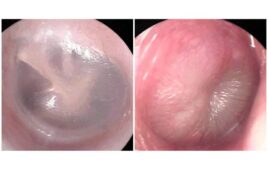
The Department of Defense’s Defense Innovation Unit and Philips are studying the ability of Garmin watches and Oura rings to collect data that can offer an early warning of COVID-19 infection. [Photo courtesy of the DOD Defense Innovation Unit]
Philips and the DOD Defense Innovation Unit (DIU) have used Garmin watches — the Fenix 6 and Vivoactive 4 — and Oura rings on more than 11,000 test patients since June 2020. They’ve measured respiration rate, oxygen saturation and heart rate with the watch and heart rate and skin temperature with the ring.
An algorithm watches for changes detected by the cloud-connected devices and offers a score from 1 to 100, with a higher number representing a higher likelihood of infection. The researchers compare it to a check-engine light warning that something could be wrong.
“These things that this algorithm is sensing are imperceptible. You wake up the next morning and see your score jump to a 20, but you feel fine,” Jeff Schneider, DIU rapid analysis threat exposure program manager, told Politico. … “It means I can isolate, it means I’m probably not going to drink that glass of wine, it means that I’m going to hydrate and get ahead of this and try not to get everyone else sick.”
According to preliminary results, the predictive algorithm is around 82% accurate. In addition, risk scores increased as early as six days before a test patient tested positive and 2.3 days before testing positive on average.
“This study showed feasibility of a real-time risk prediction score to minimize workforce impacts of infection. … This approach could deliver a powerful new practical control over global threats to workforce readiness from infectious diseases,” the report said.
Philips has filed for patent protection for unidentified technology in the study, according to the preliminary results.






